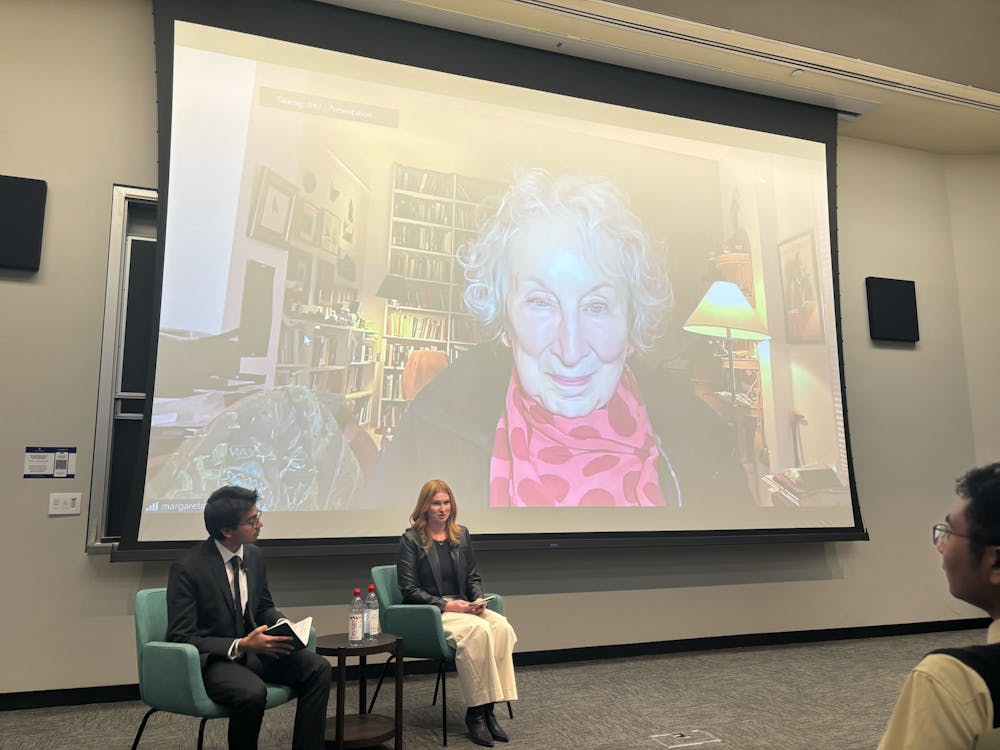On Thursday April 10, the Hopkins Lecture Series hosted an event titled “An Evening in Virtual Conversation with Margaret Atwood” in collaboration with the Aronson Program for International Studies and the International Studies Leadership Council. This event was part of their 2025 spring series to facilitate discussion on topics of domestic and international significance.
Margaret Atwood is a world-renowned Canadian author and poet best known for her speculative fiction novels, such as The Handmaid’s Tale, Oryx and Crake and The Testaments. Over the course of the virtual conversation through a Zoom call, Atwood reflected on her decades-long literary career, discussed the role of dystopian literature in modern society, and offered insights into the political and environmental concerns that permeate her work.
In an interview with The News-Letter, executive co-chair of the Lecture Series Yasmine Mettawa outlined the goals behind bringing Atwood to speak and the larger mission of the event.
“I would say that what we would like people to take away from the event is an interesting conversation. Atwood is very known for being sort of unfiltered in how she expresses her literary work and how she talks about them outside,” Mettawa said. “We want to have a conversation that has to do with politics to some degree in the [U.S.] and around the world, but also is baked into her work.”
Mettwa explained that the event would cover a wide range of topics, from women’s rights to the future of human society. She detailed how the goal of higher education is to facilitate conversations about the world that everyone lives in and how she hoped that this event would be a way for people to start conversations.
Leading the virtual conversation were students Akshat Sinha and Willa Farrell, who asked questions regarding Atwood’s new book release, her opinion on topics pertaining to the relationship between her novel and the real world, and other thoughts regarding the relationship between literature and reality.
To open the conversation, Atwood explained her reasons for moving the talk to a virtual format.
“We Canadians are rather worried about crossing the border these days,” she quipped.
During the event, Atwood discussed her upcoming memoir The Book of Lives and her involvement in the Future Library Project: an initiative aimed at collecting original works by writers that will not be published for 100 years. According to Atwood, this project involves 100 years, 1,000 trees and the works of 100 authors. Atwood said that it could be a secret manuscript, or simply a grocery shopping list — anything made of words.
She mentioned that her own work, Scribbler Moon, was to be included in the Future Library Project, and revealed how she felt that the project was — at its core — a project of hope.
“Think how hopeful it is, that the human race still exists [in one hundred years]. That people still read. That there will still be a Norway,” she said.
Sinha and Farrell moved on to ask Atwood whether she believed history is unchanging. Atwood responded by saying that while history does not always stay the same, it often resembles the past.
She used a metaphor: “The basic floor plan, if we can call it that way, has stayed the same.”
She expanded more on this topic by saying that there has never been a change, and perhaps will never be a change in human nature, but as we progress into the future, we will have a change in input. Essentially, Atwood argued, the basic human emotions, such as love, hate, envy and greed, stay the same, but the way we satisfy and enact these emotions evolves with time.
“Instead of hitting you with a rock, I might zap you with a laser beam,” Atwood said humorously, inciting a round of laughter. “The intent is the same.”
Atwood led the discussion into the French Revolution and expressed her love for history. She explained that her interest in the French Revolution stems from her opinion that the world is currently in a “French Revolutionary period.” Atwood elaborates on these thoughts, explaining how some might believe that everything must burn to the ground for “wonderful things” to arise. She emphasizes how revolution is difficult and that there is no such thing as inevitable progress.
“Revolution doesn’t necessarily help the people at the bottom,” she said. “There’s always a power structure.”
Zaynab Mirza, a junior majoring in International Studies, found the historical references compelling. In an interview with The News-Letter, she detailed the impressiveness of Atwood’s eloquence and unique takes on historical parallels and explained how the event has inspired her to read the books in the future.
“Although I have not read her books, I found that her perspective was very refreshing in that she had a very historical perspective for all of her books,” she said. “[Atwood] frequently referenced the French Revolution, which I thought was very compelling in the sense that she can relate past events to now [...]. [Atwood] said that [history] doesn’t repeat itself, but it rhymes — and that kind of stuck out to me.”
Atwood went on to explain that her books were not meant to be a critique of the academic world, but instead a solution to the problem with the story world’s “form,” such as being a dystopia or a utopia.
She referenced popular dystopian novels such as George Orwell’s 1984 and Aldous Huxley’s Brave New World, detailing how characters within the books speak as if they were describing the events to a time traveller as a comment on the resilience of humans in dystopias.
“[The books] have a history that says how there’s always been some sort of war cataclysm that has changed society,” she explained.
With The Handmaid’s Tale in mind, Sinha and Farrell asked Atwood how she understood the phenomenon falling birth rates that can be seen in many nations today.
“Let’s do a little basic math,” Atwood began. “Women of reproductive age are the core of the future. Women of reproductive age are always the minority in any society.”
She went on to depict how this imbalance means that if women — especially those of reproductive age — want enough say, they need others outside of their demographic to help.
For the final question, referring to Atwood’s 2005 essay “Polonia,” Sinha asked Atwood for her advice on how to live a meaningful life in today’s world. She explains that it’s a matter of what is meaningful to the person who is living. While life certainly isn’t fair, there must be goals, desires, interests or talents that keep a person going.
“Let’s suppose you’re a serial killer,” she proposes. “‘Who shall I kill today?’ gives your life meaning [...]. It’s going to be individual, although there are certain things that are generally true, and my view is that optimism is built in. It’s one. It’s part of the human toolkit. [...] as long as you can see some pathways to doing what you want to do, you’re going to feel that your life has meaning.”
The event concluded with a Q&A session between audience members and Atwood. A representative from The News-Letter asked Atwood who has the responsibility for knowledge, citing how Atwood mentioned earlier that a bias of propaganda has always occurred in the media and that newspapers had never told the truth.
In response, Atwood clarified that her earlier statement about newspapers “telling the truth” was meant to critique the nostalgic belief in a golden age of unbiased journalism. Instead, she highlighted the importance of transparency and accountability in mainstream media, noting that traditional news organizations can be held legally responsible for misinformation — hence their practice of publishing corrections.
“So, I said that ‘Once upon a time, people thought that they were telling the truth’ [...]. In favor of maintaining mainstream journalism is that they have an address, and you can sue them. Which is why they will publish these dainty little corrections if they’ve got something wrong,” she said. “Whereas if it’s just somebody online, and you don’t know who they are, it’s open season — they can say anything.”
In an interview with The News-Letter after the event, freshman Hunter King — a Computer Engineering major — shared his impressions of the event. Despite not having read Atwood’s works prior, he was inspired by her insights into history and hopes that his younger sister (who is interested in literature) can one day emulate Atwood’s success.
“I honestly hadn’t read any of her books going in, but it was interesting to me because my little sister is because interested in reading and writing — and potentially might want to become an author,” he said. “It’s inspiring because Margaret Atwood was really insightful in a way that I don’t think I’ve seen before [...]. I really got a new sense of the value of being well-read and spending your life studying literature, and I hope that one day my sister can grow up to be like her.”
From a different perspective, freshman Gaayathri Nadarajah — a freshman studying Public Health Studies — outlined her excitement about the opportunity to ask Atwood questions as a fan of her novels in an interview with The News-Letter.
“It was a wonderful opportunity, and I think I was just ecstatic, in general, to be able to hear her thoughts candidly [...]. I truly, truly love the world that [Atwood] has built in her novels,” she said. “I love how much thought she’s gone into creating every line. I personally love annotating her novels [because] I think [her books] are great lessons in good writing. And also, truthful writing because there is a lot of truth in there.”





